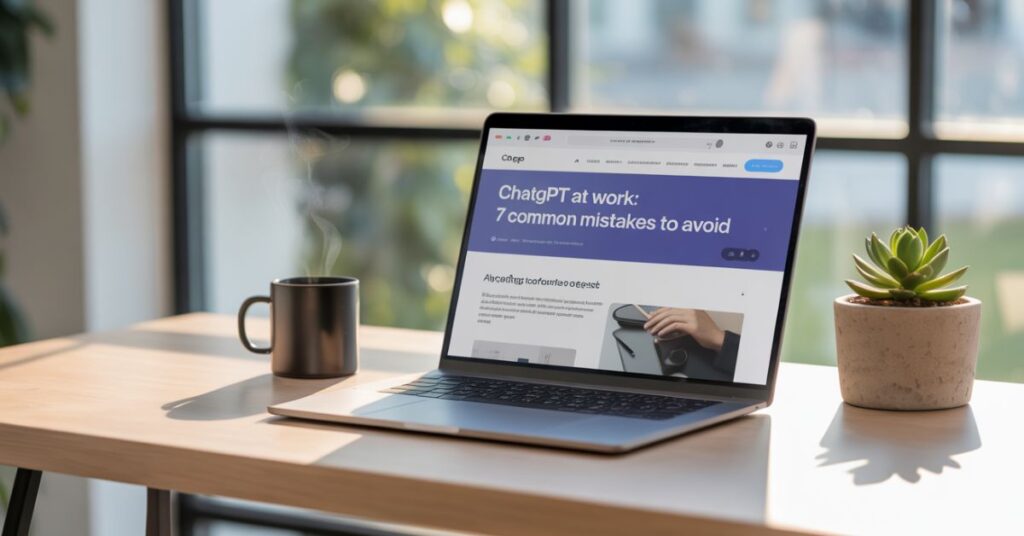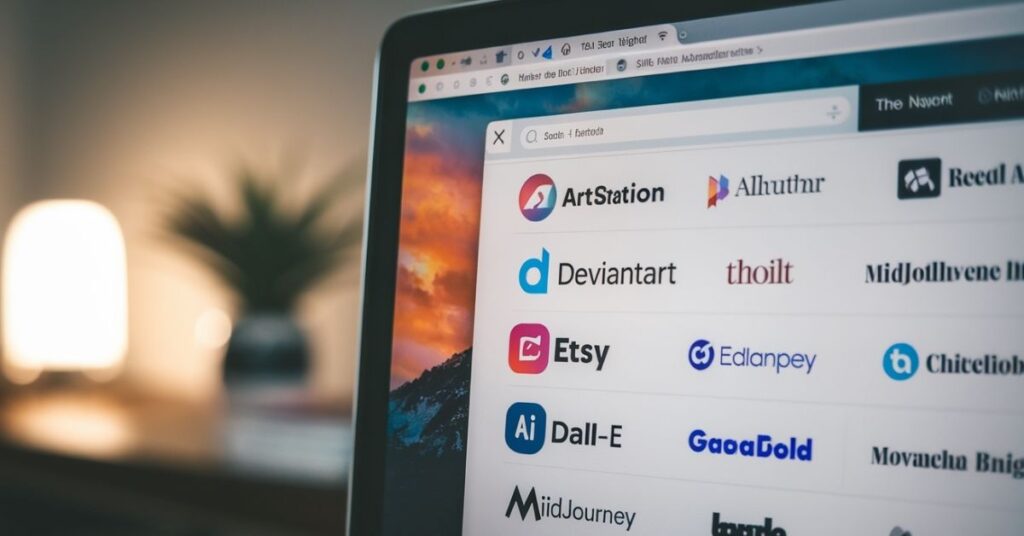ChatGPT is now a part of 60% of office work. It helps write emails, take notes, and save time. But many don’t know they are using it the wrong way. It feels like a smart tool, but it can become a silent risk. One wrong input, and you might leak private info. Many trust AI blindly without checking facts. Some even depend on it too much for daily tasks. These habits can cause serious problems. Are you using ChatGPT safely or just following the trend? This guide shows the hidden risks of ChatGPT in the workplace. Learn what people are doing wrong and how to avoid it. Before this tool turns against you, find out how to use it the right way. Don’t let small mistakes cost you big.
Why Employees Use ChatGPT at Work
Many employees now because it saves time. It gives quick answers, helps write emails, creates content, and even solves code problems. Instead of spending hours on small tasks, workers get things done faster with AI. This means less stress and more time for other important work. It also helps when people feel stuck and need fresh ideas for writing, planning, or marketing.
ChatGPT is like a fast helper in the background. That’s why its use is growing so fast. In busy offices, everyone wants to be quicker and more productive. But the real reason people love it? It makes hard tasks easier and saves brainpower for bigger things. For those who feel overworked or behind, using AI in the workplace feels like a smart, much-needed shortcut.
7 Common ChatGPT Mistakes You Must Avoid at Work
Mistake 1: Sharing Confidential Company Information
One big mistake employees make is pasting private information into ChatGPT. Many think it’s safe, but ChatGPT isn’t fully private. What you type can be stored or reviewed, creating a real risk of data leaks. Sharing emails, contracts, passwords, or company secrets might seem harmless, but it’s not.
Even quick tasks like editing client emails or drafting proposals can expose sensitive information. Once it’s out, you can’t take it back. That’s why ChatGPT data security is so important. AI tools are helpful, but they aren’t built for handling confidential content. Always think twice before sharing private data. Use AI wisely to stay safe and protect your workplace from privacy risks. One careless move can lead to a major breach.
Mistake 2: Treating ChatGPT Like a Human Colleague
Many people treat ChatGPT like a real teammate, but it’s not human. AI does not feel, think, or understand emotions the way people do. It can’t sense tone, show empathy, or make good judgment calls. That’s a big problem when using it for sensitive tasks like HR replies, performance reviews, or emotional support messages.
Relying on ChatGPT for these jobs can come off as cold or even offensive. It may say the wrong thing without meaning to. That’s because it lacks the human touch. Emotional intelligence is key in many workplace situations, and AI just can’t replace that. Don’t make the mistake of trusting ChatGPT where human insight is needed. It’s smart, but not thoughtful. Know when to step in and write it yourself.
Mistake 3: Blind Trust in AI-Generated Information
Many users blindly trust everything ChatGPT says. But AI isn’t perfect. It can give wrong facts, outdated info, or even biased content. Sometimes, it makes things up; this is called a hallucination. If you copy and share that info without checking, it can hurt your work or mislead others.
This is a big risk, especially in reports, presentations, or client work. You should always double-check numbers, sources, and tone. Never assume the AI is always right. Fact-checking AI content is not extra work; it’s necessary. Verifying AI content keeps your work accurate and trustworthy. Don’t let ChatGPT’s mistakes become your mistakes. Stay sharp, and review everything before hitting send.
Mistake 4: Disregarding Company Policies and Compliance
Some employees use ChatGPT without knowing their company’s rules. That’s a big mistake. Many companies now have strict policies about AI tools. Using ChatGPT without permission can break these rules and even cause legal trouble.
Workplace AI compliance is serious. If you share sensitive info or use AI where it’s not allowed, you could face warnings or even lose your job. Company policies are there to protect data, clients, and your role. Always check the rules before using ChatGPT at work. Just because it’s helpful doesn’t mean it’s allowed. Ignoring policies can turn a smart tool into a risky decision. Stay informed, and don’t let AI cost you your career.
Mistake 5: Producing Generic or Plagiarised Output
Using ChatGPT to create content is easy, but overusing it without editing can backfire. Many people copy AI text as-is, which often sounds generic or even copied from other sources. This leads to content duplication and can damage your brand’s voice.
AI plagiarism is a growing concern. If your work looks too similar to others or lacks originality, it won’t stand out, and it might even get flagged. ChatGPT is great for support, but it should not replace your unique ideas. Always add your voice, style, and edits. Let AI assist, not create for you. Real value comes from originality, not shortcuts. Don’t let lazy content hurt your work or reputation.
Mistake 6: Poor Prompting = Poor Results
A common mistake is giving ChatGPT vague prompts like Write a report. The result? Generic, unclear, or off-topic content. The quality of AI output depends on how you ask. Poor prompting leads to poor results.
Instead, try specific instructions: Summarise these 3 sales KPIs in 150 words for a client update. This gives ChatGPT a clear goal and tone. That’s the power of good prompt engineering.
Better prompts save time, reduce edits, and improve accuracy. Think of it like giving directions: be clear, focused, and detailed. Learning to write better prompts makes your AI results smarter and more useful. Don’t expect great output from lazy input.
Mistake 7: Failing to Disclose AI Use When Required
Not telling others you used ChatGPT can be a serious mistake. In fields like law, academia, journalism, and content marketing, transparency matters. If you use AI and don’t say so, it can lead to trust issues or even legal trouble.
Some companies, schools, or industries require clear disclosure of AI use. Hiding it can damage your credibility. Readers and clients deserve to know what was written by a person and what was AI-assisted.
AI use disclosure builds trust and shows you are following ethical practices. Being open about AI tools also protects you from future claims of dishonesty or plagiarism. Don’t let a smart shortcut turn into a serious risk. Always check if disclosure is needed, and be honest when it is.
Data Security and AI Memory Risks
Many users don’t realize that ChatGPT can remember parts of a conversation during a session. If you reuse the same chat or forget to clear sensitive info, there’s a risk it might carry over. This creates a hidden data leak threat.
For example, if you mention client names or private figures once, they might appear again unexpectedly. That’s where AI memory risk becomes real.
To stay safe, always anonymize sensitive data. Don’t share names, numbers, or internal details. And when you’re done, reset the thread or start a new one. ChatGPT is helpful, but it’s not built for storing secure information long-term. Stay cautious and treat every chat like it could be seen. Data safety should always come first.
Bonus Concern: The Missing Human Touch in Workplaces
As helpful as ChatGPT is, it can’t replace the human touch. It lacks real emotions, creativity, and gut instinct. That matters a lot in tasks like negotiations, conflict resolution, or customer support, where feelings and empathy play a big role.
Relying only on AI can make your work feel cold or robotic. Clients and coworkers notice when something sounds off. The emotional intelligence AI gap is real, and no prompt can fully fix it.
Human insight brings warmth, connection, and trust, things AI simply can not mimic. Use ChatGPT for support, but not for moments that need real understanding. In the end, people still work best with people.
How to Use ChatGPT Safely: 7 Must-Follow Tips
1. Avoid Sharing Sensitive or Personal Data
When using ChatGPT, never input private information like passwords, internal company documents, client names, or financial records. ChatGPT sessions aren’t encrypted for sensitive use, and such data could be at risk if reused or stored unknowingly.
2. Understand ChatGPT’s Limitations
ChatGPT can generate confident but inaccurate or outdated information. Always double-check facts, figures, and references before relying on their output, especially for decisions that affect your work, business, or reputation.
3. Follow Your Company’s AI Policy
Before using ChatGPT on office tasks, make sure your workplace permits AI tool usage. Some companies have strict policies or confidentiality rules that restrict AI-generated content. Ignoring them could result in compliance issues or disciplinary action.
4. Don’t Use AI for Final Legal or Financial Decisions
ChatGPT is not a licensed advisor. Never rely on it alone for legal advice, financial planning, or contracts. Use it for drafts or summaries, but always consult a professional before making critical choices.
5. Edit and Humanise Everything
AI-generated text often lacks personality and nuance. Always review the content and rewrite parts to match your voice, tone, and audience. This adds credibility and avoids sounding robotic or generic.
Conclusion:
ChatGPT is powerful, but careless use can hurt your work and image. Many people make small mistakes, like sharing private information or trusting incorrect facts. These can lead to big trouble. AI helps, but it can’t think, feel, or judge like humans do. Use ChatGPT as a tool, not a full replacement. Always review, edit, and follow your company’s rules. Be careful with what you type and share. Safe and smart use protects your job and builds trust. Don’t let a helpful tool turn into a risky one. Use it with care and purpose. Now it’s your turn. How do you use ChatGPT at work? Share your thoughts, tips, or questions in the comments and help others use it better, too.
FAQs
Is it safe to use ChatGPT at work?
Yes, if used correctly. Always follow company policies, avoid sharing sensitive data, and double-check AI-generated content before use.
Can ChatGPT leak company data?
Yes, if you input private information. ChatGPT stores session context, which may pose data security risks if not handled with caution and proper privacy practices.
What are the risks of using AI tools in the workplace?
Risks include data leaks, policy violations, incorrect outputs, lack of empathy, and over-reliance, leading to damaged reputation, legal trouble, or job-related issues.


